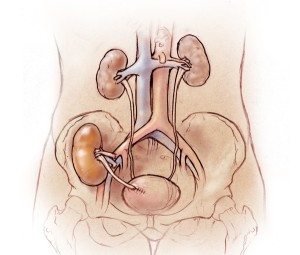Kidneys plays a vital role in our body such as, filtering unwanted substances from blood and excreting them as urine, release of several hormones that regulate blood pressure, releasing erythropoietin that stimulates RBC production etc. Some of the main causes of kidney failure are high blood pressure, Diabetes mellitus, polycystic kidney diseases, urinary tract anatomical problems, glomerulonephritis etc.
 When kidney stops functioning, it leads to accumulation of toxic substances in the body, rise in blood pressure, reduced RBC production, retaining excess fluids by body etc. If not treated early, it might lead to chronic kidney diseases. Renal diseases can be treated by dialysis (hemodialysis, peritoneal dialysis etc.) and kidney transplantation.
When kidney stops functioning, it leads to accumulation of toxic substances in the body, rise in blood pressure, reduced RBC production, retaining excess fluids by body etc. If not treated early, it might lead to chronic kidney diseases. Renal diseases can be treated by dialysis (hemodialysis, peritoneal dialysis etc.) and kidney transplantation.
Kidney transplantation is a transfer of kidney from a donor who is healthy and alive or a deceased person. Kidney transplant is preferred over dialysis in severe cases of renal diseases. It is regarded as the best cure for the end-stage renal disease. A kidney transplanted patient can stay active and perform the activities that he/she have done before transplantation. There are three stages in kidney transplantation, they are:
(i) Pre-transplantation: Medical evaluation of the patient is a compulsory process prior to the transplantation of kidney, in order to know the patient’s healthy condition for the surgery. This process might take few weeks to few months of time, based on the patient’s health condition. Both, the donor and the acceptor are evaluated for suitability of transplantation based on their blood type, tissue typing (HLA factor test), antibodies and serological test (for viruses such as HIV, hepatitis and CMV).
(ii) Transplantation: The kidney transplantation is a heterotopic process, where the kidney is place in different location from the already existing kidney in the body. The original or the existing kidneys are not removed until they cause any uncontrollable problems, such as frequent kidney infections, enlarged kidneys, rise in blood pressure etc. The surgery for kidney transplantion lasts for 2-4 hours.
(iii) Post- transplantation: The most significant part after the kidney transplantation is to prevent the rejection of grafted kidney. The post-transplantation period is very stressful for the patient, where on one hand they recover from the surgery and on other they are anxious about the rejection of the organ. Kidney rejection can be reduced by using drugs that suppress the immune system, such as Cyclosporine, Corticosteroids, Azathioprine, tacrolimus, sirolimus, mizoribine etc. Some of the symptoms of rejection of transplanted kidney are hypertension, swelling of face, arms or legs due to fluid retention. Patient must be monitored by the transplantation team for signs of rejection after transplantation.
Precautions to be followed after Kidney Transplantation:
- Regular check-ups and updating the transplantation team with the patient’s health status.
- Having medication as suggested by the transplantation team.
- As much as possible, the kidney transplanted patient must avoid drugs, alcohol, smoking, chemicals and other toxic substances.
Drawbacks:
- Sometimes Kidney transplantation is associated with some complications, such as wound healing, bleeding or infections.
- Sometimes it leads to difficulty in blood circulation to the kidney and urine flow from the kidney.
